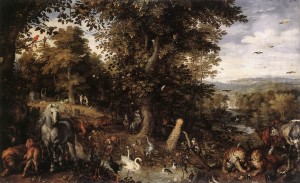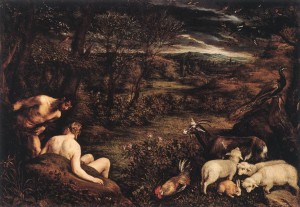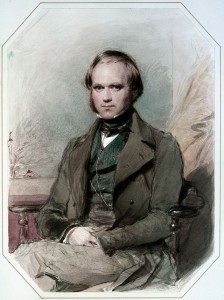1) The fundamental question is not “how did God create the universe?” but “did God create the universe”? Do not confuse the design argument with questions about evolution.
2) The discovery of laws and mechanisms which describe how particles behave or how life came about do not explain God away. Because a rational, personal God would create an orderly, regular universe, theism led the first scientists to predict that nature would be governed by laws and mechanisms which could be described in the language of mathematics. The discovery of such laws and mechanisms confirm theism; they do not undermine it at all!
 3) A universe ordered by laws and mechanisms which can be described in the language of mathematics seems much likelier if theism is true. In fact, the patterns that physics reveals are quite stunning in their elegance. Our universe is not only ordered; it can only be described by using deep, advanced mathematics. This would seem to require a mathematician of the highest order: the hall-mark of a designer.
3) A universe ordered by laws and mechanisms which can be described in the language of mathematics seems much likelier if theism is true. In fact, the patterns that physics reveals are quite stunning in their elegance. Our universe is not only ordered; it can only be described by using deep, advanced mathematics. This would seem to require a mathematician of the highest order: the hall-mark of a designer.
4) There are arguably good grounds for rejecting the hypothesis of unguided, or unplanned, evolution. The mechanisms which explain evolution would themselves require design. Evolution depends on replicators: structures which cause copies of themselves to be made; each acts as its own template for copying. The copying system must allow for a little variation in each new generation: this allows a population of variants to come into existence. Yet the copying process must also be very reliable – otherwise beneficial variations would not be preserved. Finally, to explain taxonomic diversity and organised complexity , these replicators must be able to combine to form vehicles – that is, structures ( for example, organisms) which work to propagate their replicators
 5) It is unlikely that these mechanisms would produce complex, conscious life without planning or guidance. There are no easy, gentle slopes to the peak of Mount Improbable. Imagine a long sequence of evolutionary transitions from the first cells all the way to us. Even if each transition in this chain — from the first to the second, from the second to the third, and so on – were highly probable, it would not follow that the transition from the first to the last is highly probable. Probabilities multiply; multiply a big probability like 9999/10000 by itself enough times and you arrive at a very, very small probability!
5) It is unlikely that these mechanisms would produce complex, conscious life without planning or guidance. There are no easy, gentle slopes to the peak of Mount Improbable. Imagine a long sequence of evolutionary transitions from the first cells all the way to us. Even if each transition in this chain — from the first to the second, from the second to the third, and so on – were highly probable, it would not follow that the transition from the first to the last is highly probable. Probabilities multiply; multiply a big probability like 9999/10000 by itself enough times and you arrive at a very, very small probability!
6) Some of the events in the history of life on Earth were exceedingly improbable . The origin of life is incredibly improbable because the different pre-biotic building blocks can only be assembled in radically different environments. It is incredibly improbable that the various chemicals, minerals and catalysts would ever be found together in the same environment; even then, something would need to cause them to react in the correct way. The emergence of the first Eukaryotic cells (necessary for multicellular life) might even be more improbable than the origin of life. The origin of consciousness is not merely improbable – it seems completely inexplicable!
7) Theism appeals to a kind of explanation we are familiar with – personal explanation. Of course, there are differences between God and human agents, but theism relates to one of the two main kinds of explanation (personal and scientific). Scientific explanations deal with impersonal objects and laws of nature; we observe and measure how some events regularly follow others. But there is more to our world than the impersonal; we cannot understand or predict human activity without talking about agents and purposes. In a scientific explanation of a person’s actions, events in the person’s brain cause the person to act. The person is passive – brains states cause desires and beliefs: these do all the causal work. But in an agent explanation the person is active, not passive. The person assesses his desires and beliefs and then chooses to act. So a person must have an undetermined power to choose in an agent explanation.
8 ) Theism is a very clear and simple hypothesis. God is unlimited, personal power. We all know what it is to be personal: to be thinking, conscious beings. We can all readily experience personal power – this is simply the power to make choices. Our power is quite limited in nature, as we are finite physical beings. As sole creator, God’s power and awareness could not be limited by anything else. So, because God would be aware of everything that he could do, and everything that he has done, God would know every truth. This idea of God is perfectly meaningful; and if science has taught us anything it is that we should not dismiss an idea because it seems strange or difficult to imagine.
9) In theistic explanation, as in all agent explanations, the agent’s abilities are cited (in this case, the agent is a being of unlimited personal power); then we cite a reason that would give that agent a plausible reason to bring an event about (in this case, the order, structure and beauty of our universe are goods that a creator would desire).
 10) Agent explanations don’t use laws or mechanisms because they assume that there is more to the universe than particles, laws and mechanisms. This does not count against theism. Even in a science such as physics, mechanisms are not nearly as important as is often assumed. Isaac Newton’s theory of gravity, for example, provided powerful explanations of planetary motion even though there was much disagreement about the mechanism by which one massive body exerted a force on another. The same applies in quantum theory; no-one really knows what’s going on, but quantum theory certainly explains a lot!
10) Agent explanations don’t use laws or mechanisms because they assume that there is more to the universe than particles, laws and mechanisms. This does not count against theism. Even in a science such as physics, mechanisms are not nearly as important as is often assumed. Isaac Newton’s theory of gravity, for example, provided powerful explanations of planetary motion even though there was much disagreement about the mechanism by which one massive body exerted a force on another. The same applies in quantum theory; no-one really knows what’s going on, but quantum theory certainly explains a lot!
11) Why think that God would want to create a universe of complex order? Well, God and humans would have certain things in common. God would, like us, have rationality and agency -unless we wish to embrace some form of moral scepticism – we should acknowledge that both would recognise similar values. Organised complexity is extremely unlikely on chance alone. But an agent could have reasons to create organised complexity if it made something valuable – like a painting, song or poem. Now, only a nihilist or misanthrope would deny that our universe exhibits many valuable features. So God would have a good reason to create our universe, and to create life. The point is that complex and valuable state of affairs are much, much more likely given theism than chance.
12) We also know from observation and our own direct experience that rational agents bring about complex states of affairs that are ordered for some purpose : engineering and art spring to mind. Now, life and the universe could have a purpose. If humans can express themselves in art, why could God not express himself in creation? And our universe makes the existence of humans possible – so we could be one reason God created the universe.
